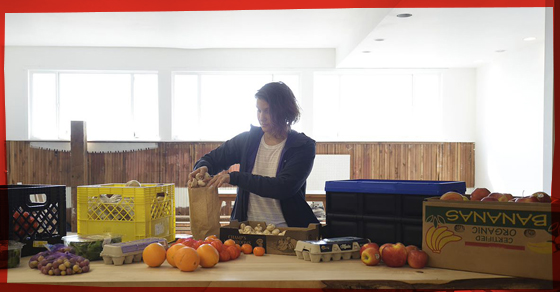Food Stash: Fighting waste and filling pantries

About this story
- Organization
Food Stash/ Food Stash Foundation - Region
Lower Mainland BC - Area of impact
Energy and Environment/Local and Organic Food - Type of investment
Shared Success grant
One day in the summer of 2015, a high school teacher sat down to watch a documentary. What he did next is changing the lives of hundreds of families across Greater Vancouver.
The teacher was David Schein. The movie was Just Eat It: A Food Waste Story, an independent film that follows the experiences of a young Vancouver couple after they vow to eat nothing but food discarded by grocers, restaurants and suppliers.
For most of us, Just Eat It would have been little more than an enlightening story about food waste in this country, which costs $31 billion a year in Canada alone. Worldwide the numbers stupefy: in wealthy countries like the U.S. and Canada, around 40 per cent of all food produced is ultimately wasted, according to the U.N. Food and Agriculture Organization. According to the Commission for Environmental Cooperation, a NAFTA-based agency, Canada wastes 396 kilograms per capita of food each year. Global estimates of food waste run to 1.3 billion tons a year, and can be found at nearly every stage of the food system: from farms to distributors, to grocers, restaurants, and finally, in households.
But David saw the need and the social purpose behind Just Eat it, so he made it personal. At 28, he quit his job teaching languages at King David High School, received funding including a $10,000 Shared Success grant from Vancity and launched Food Stash, a not-for-profit grocery collection and delivery service dedicated to meet the needs of food-insecure households and community charities.
Looking back, David sees that his education, and options for teachers in BC, give him the freedom to choose a new career--even for one that wouldn’t make him wealthy. But it was his sense of compassion and adventure that made him leave his regular life behind and devote himself to Food Stash. “I thought it could be fun to try,” he says.
“It would have been easy for me to go back to teaching, so the worst-case scenario would be that we donated a lot of food for a year or two, and that would be that. I didn't see much downside or risk.”
Today, Food Stash and Food Stash Foundation are fueled by the energy of 25 volunteers who make 60 deliveries a week to about 26 community service groups and households over a 135,000-kilometre area in Vancouver, Burnaby, Richmond, Port Moody and beyond.
Over time, David and his volunteers built up their expertise in gauging freshness and food safety. They’ve gained the insight they need to see beyond that misshapen apple or the dented can or package; they see the goodness of the day-old grains. They’re confident in the quality of yogurt and milk nearing their best-buy date. While supermarkets and suppliers may discard these foods, Food Stash volunteers see in them the ingredients of a hearty meal ready for families who need it most.
So far, nearly 30 suppliers, including Whole Foods, IGA, Nesters, Green’s, and Rosemary Rock Salt bagels have become partners with Food Stash. All of them save their imperfect produce, packaged food that may be closing in on best-before dates, day-old grain products, and items that are not selling fast enough, for Food Stash bins.
At first, he and his volunteers acted as a go-between for grocery stores and bakeries in a kind of “drop box” program. Then social service groups serving the Downtown Eastside, Jewish Family Services and the Inland Refugee Society introduced him to families and individuals who needed deliveries.
Today, more than two dozen household delivery clients pay between $30 and $60 a month, depending on the number of household members. Paying the fee is significant for clients who prefer to place value on the food. “It’s about giving them the dignity [of purchasing their own food],” he says.
He says he’s seen first-hand the tiring daily grind that gets in the way of progress for many food-insecure households. Many of his clients can’t afford to live close to their workplaces, so they could spend an hour or more on transit. To arrive home late from a low-paying job, only to care for children, shop for groceries and prepare a meal, can be exhausting.
“They are hardworking and willing to put in long hours. Some work in South Vancouver and live in Port Moody, so a [food bin] drop off is a relief.”
Food Stash’s social impact has taught David much about the power of community. “I am most proud of the fact that there are now 25 volunteers who do weekly deliver runs,” he says.
“People in Vancouver are caring and giving with their time. They want to help reduce food waste and help others who need a little extra support.”